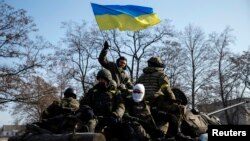The Ukraine cease-fire agreement signed Thursday in Minsk shares many of the features of the cease-fire accord reached in the Belarusian capital last September. That accord ended up being violated more than observed. The new agreement could be undermined by provisions that are all its own.
The September's agreement called for “permanent monitoring of the Ukrainian-Russian state border and verification by the OSCE (Organizations for Security and Cooperation in Europe) with the establishment of a security zone in the border regions of Ukraine and the Russian Federation.”
The new agreement states that “full control” over Ukraine’s border with Russia must be restored to the Ukrainian government — but not immediately. Rather, restoration will begin “on the first day after local elections” are held and completed by the end of the year, but only if a political settlement is implemented.
That political settlement, according to the new agreement, should include holding local elections in the parts of the Donetsk and Luhansk regions currently under the control of the Russia-backed separatists, and constitutional reform by the end of 2015. All of this should be done in “consultation” with representatives of the rebel-controlled areas.
The vagueness about when Ukraine will gain full control over its borders may have been necessitated by the territorial gains made by the separatists in recent weeks, reportedly with the help of Russian military units and hardware sent over the border.
Ukrainian President Petro Poroshenko appeared to be pushing back against this new status quo Thursday. He said the social benefits his government cut off last year for what he called “the occupied territories” in eastern Ukraine should be restored only after Ukraine's "state sovereignty" — meaning, among other things, control of its own borders. The social benefits include funding for pensions, schools and medical facilities.
The agreement signed Thursday also states that "decentralization" must be a "key element" in the reform of Ukraine's constitution. Russian President Vladimir Putin focused on this point, telling reporters Thursday that the agreement calls for constitutional reforms that take into account what he called the "legitimate rights” of the people living in Donetsk and Luhansk.
In an apparent response to the Russian leader, Poroshenko stressed later Thursday that the Ukrainian side had not agreed to grant the rebel-held areas in eastern Ukraine "autonomy," nor had it backed away from opposing the country's "federalization" — something Moscow has repeatedly called for.




